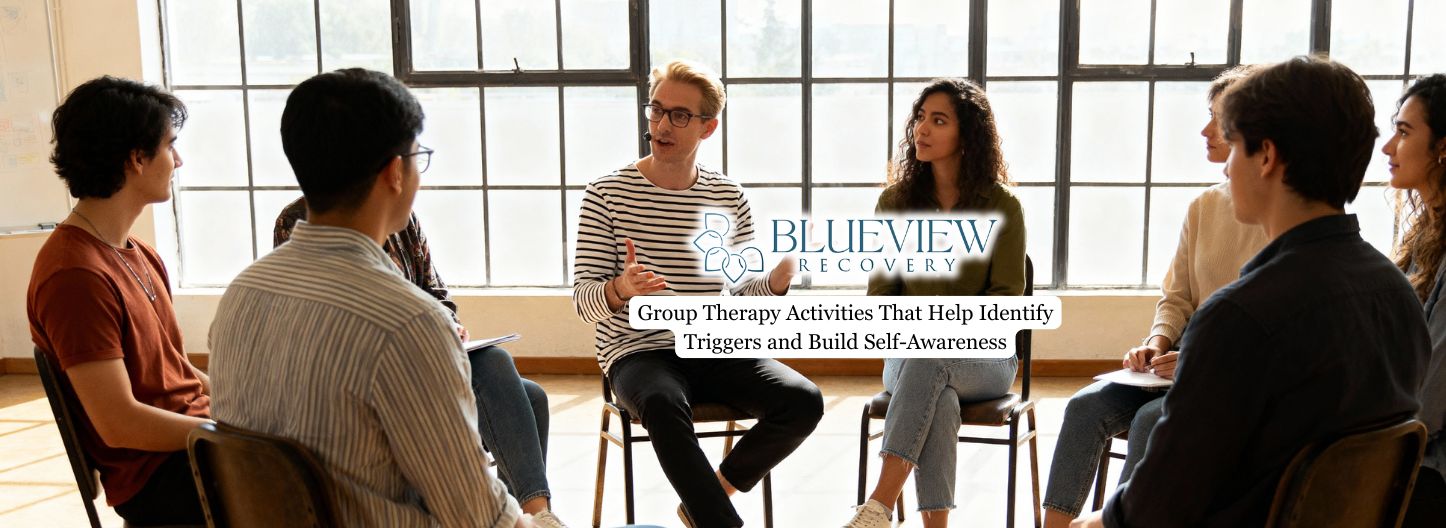Group therapy plays an essential role in addiction recovery by providing a supportive environment where individuals can openly discuss their experiences and emotions. Through shared interaction, participants not only gain a deeper understanding of themselves but also develop the skills needed to manage their triggers effectively.
This article explores key group therapy activities that promote self-awareness and help individuals recognize and address the underlying causes of their addiction.

The Connection Between Triggers and Self-Awareness
Triggers are emotional, environmental, or situational cues that can spark cravings and lead to relapse. Developing self-awareness enables individuals to recognize how these triggers impact their thoughts, feelings, and behaviors. Participants explore these connections through open discussions and guided reflection, often within a group therapy program designed to build insight and resilience.
Hearing others describe similar experiences helps individuals gain clarity about their own responses and learn that recognizing triggers is not a sign of weakness, but an essential step in maintaining control. This awareness fosters emotional intelligence, enabling participants to make informed, mindful decisions in the face of challenging circumstances, thereby laying the groundwork for sustained recovery and growth.
Reflective Discussion Circles
Reflective discussion circles are one of the most effective tools used in group sessions. Group members are invited to share personal moments when they experienced emotional tension, temptation, or conflict. The group then collaborates to unpack the emotions and situations that contributed to these moments, often revealing underlying stressors such as guilt, fear, or loneliness. This setting also highlights the benefits of peer support, as participants find encouragement and understanding from others who share similar experiences.
Facilitators guide these conversations to ensure that every participant feels supported and heard. These discussions often progress through the different stages of group therapy, from initial trust-building and openness to deeper reflection and eventual closure, allowing members to develop comfort and vulnerability at a natural pace. This evolving process helps individuals link external situations with internal reactions, making it easier to recognize relapse triggers. It also strengthens self-awareness and fosters compassion, as participants realize they are not alone in their struggles.
Guided Journaling and Sharing Sessions
Writing is another powerful tool for self-discovery. Group journaling sessions encourage participants to express their thoughts and emotions on paper, which can be particularly useful for those who struggle to articulate feelings verbally. These journals often include reflections on daily challenges, cravings, or emotional highs and lows. During group therapy, members may choose to share portions of their writing with others, creating an opportunity for feedback and mutual understanding.
These written reflections highlight recurring patterns, such as certain environments or emotional states that act as triggers. Journaling helps translate complex emotions into tangible insights, empowering individuals to take proactive steps toward emotional regulation and growth.

Role-Playing Scenarios for Real-Life Application
Role-playing exercises enable participants to practice handling challenging situations in a safe and controlled setting. For example, they might reenact scenarios like attending a social gathering where alcohol is present or managing a conflict with a family member. These activities help partakers identify emotional reactions and test healthy coping strategies before applying them in real life.
Through this process, individuals develop practical communication skills, enhance their problem-solving abilities, and build confidence in their ability to maintain sobriety under pressure. Discussing these role-play experiences with the group afterward reinforces accountability and highlights alternative ways to respond to stress without turning to substances.
Emotional Awareness and Mindfulness Practices
Mindfulness techniques, such as guided breathing, grounding exercises, and emotion labeling, are frequently used in therapy to enhance emotional regulation. These practices teach participants to pause and observe their emotions without judgment, enabling them to respond thoughtfully rather than impulsively. Various therapy approaches often incorporate mindfulness practices to promote awareness and self-control.
Mindfulness sessions may feature guided meditations or body scans that help participants become aware of where tension or anxiety manifests physically in their bodies. Learning to recognize and name emotions, such as anger, shame, or sadness, encourages curiosity rather than avoidance. Practicing these techniques together builds consistency, accountability, and a shared commitment to emotional growth and inner calm.
Final Thoughts from Blueview Recovery
Developing self-awareness through interactive, group-based activities is crucial for identifying triggers and sustaining long-term recovery. Practices such as reflective discussions, journaling, mindfulness, and role-playing empower individuals to recognize patterns, regulate emotions, and navigate challenging situations with clarity and control.
At Blueview Recovery, our group therapy programs in Philadelphia, PA, are designed to foster emotional awareness, enhance coping skills, and cultivate supportive peer connections. Through engaging in guided exercises and discussions, clients learn to identify triggers and practice healthier responses within a compassionate, judgment-free community. Our goal is to help each person develop the self-awareness and confidence necessary to achieve and maintain lasting sobriety.





